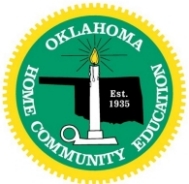|
St. Joseph's Cemetery is located on the east side of the intersection of N. Glade
Ave and 39th St in Bethany, on the west border of Eldon Lyon Park. Enter park at
south entrance and at end of entry drive, turn left and continue on around to
north as far as you can go. Park facing west (facing the basketball court and baseball field).
Look for a grove of trees that circle a fenced in area. You are there.
The GPS coordinates are 353042N and 0973842W.
Small purple irises mark a grave to the left of the entrance gate. At the time of our visit to
this small cemetery little wild flowers were in bloom. The cemetery is approximately 100
feet by 290 feet. All of the markers are flat to the ground and not many markers remain.
In the grove of cedar trees is an iron fence that is around part of a concrete form covered
with leaves. There are only three stones that are readable and one concrete one about the
same size with no identifiable words.
The whole area was part of the St. Joseph Orphanage, which included a farm where the
Eldon Lyon Park is now. Father Kekeisen founded the children's home in 1912. Sisters of
Mercy had charge of the orphanage during the years 1912-1930. The Carmelite sisters
operated it from 1933 to 1945. Missionary Sisters of the Most Blessed Trinity then operated
it until it closed. The cemetery is now owned by The Catholic Diocese of Oklahoma and
maintained by Resurrection Cemetery.
A Chapel was built in 1936 and a school and gym were built in 1939 for first through 8th
grades. The inside of the Prayer Tower is beautifully made of sparkling quartz. The buildings
on top of the hill were part of the orphanage and now are the headquarters for the International
Pentecostal Holiness Church. The people at the headquarters were very helpful in aiding us to
get information on this cemetery.
David Wehling, one of the children, drowned in the stock tank. Sister Rosemary died of measles
the next year. David Eugene Woodend died of rheumatic fever and was buried in the cemetery.
There were orphans, priests, and nuns buried in this cemetery. Originally, a single brick marked
each child's grave on the north side of the entrance. Most adults were buried to the south.
|
|


|

